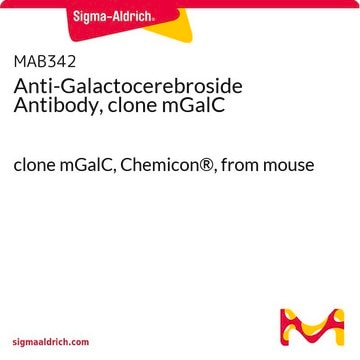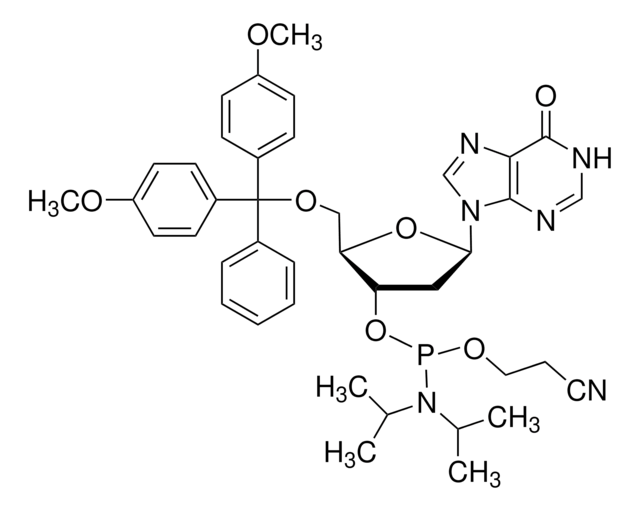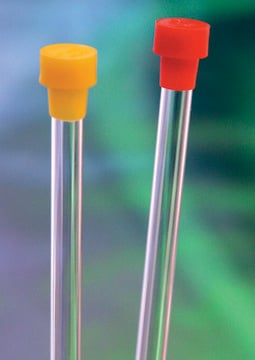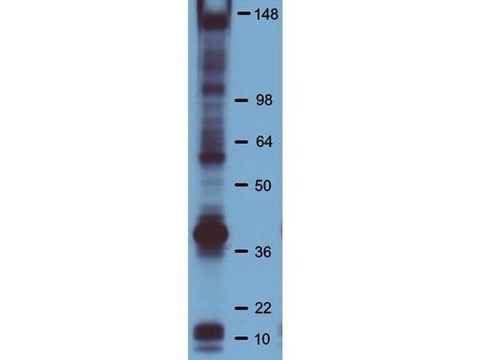MABN616
Anti-Potassium Channel Kv1.1 Antibody, clone K36/15
clone K36/15, from mouse
Synonym(s):
Potassium voltage-gated channel subfamily A member 1, RBKI, RCK1, Voltage-gated potassium channel subunit Kv1.1
About This Item
IHC
WB
immunohistochemistry: suitable
western blot: suitable
Recommended Products
biological source
mouse
Quality Level
antibody form
purified antibody
antibody product type
primary antibodies
clone
K36/15, monoclonal
species reactivity
mouse, rat
technique(s)
immunofluorescence: suitable
immunohistochemistry: suitable
western blot: suitable
isotype
IgG2bκ
NCBI accession no.
UniProt accession no.
shipped in
wet ice
target post-translational modification
unmodified
Gene Information
rat ... Kcna1(24520)
General description
Specificity
Immunogen
Application
Neuroscience
Ion Channels & Transporters
Immunofluoresense Analysis: A representative lot from an independent laboratory detected Potassium Channel Kv1.1 in Kv1.1 transfected COS-1 cells (Tiffany, A. M., et al. (2000). J Cell Biol. 148(1):147-158.).
Immunhistochemistry Analysis: A representative lot from an independent laboratory detected Potassium Channel Kv1.1 in Kv1.1 transfected COS-1 cells (Wenzel. H. J., et al (2007). Epilepsia. 48(11):2023-2046.).
Immunohistochemistry Analysis: A representative lot from an independent laboratory detect Potassium Channel Kv1.1 in wild type mouse hippocampus tissue, and demonstrated a loss of signal in Potassium Channel Kv1.2 knock out mouse hippocampus tissue (Prof. J. Trimmer, University of California, Davis.).
Quality
Western Blotting Analysis: 2 µg/mL of this antibody detected Potassium Channel Kv1.1 in 10 µg of mouse brain tissue lysate.
Target description
Physical form
Storage and Stability
Analysis Note
Mouse brain tissue lysate
Other Notes
Disclaimer
Not finding the right product?
Try our Product Selector Tool.
Storage Class Code
12 - Non Combustible Liquids
WGK
WGK 1
Flash Point(F)
Not applicable
Flash Point(C)
Not applicable
Regulatory Listings
Regulatory Listings are mainly provided for chemical products. Only limited information can be provided here for non-chemical products. No entry means none of the components are listed. It is the user’s obligation to ensure the safe and legal use of the product.
JAN Code
MABN616:
Certificates of Analysis (COA)
Search for Certificates of Analysis (COA) by entering the products Lot/Batch Number. Lot and Batch Numbers can be found on a product’s label following the words ‘Lot’ or ‘Batch’.
Already Own This Product?
Find documentation for the products that you have recently purchased in the Document Library.
Our team of scientists has experience in all areas of research including Life Science, Material Science, Chemical Synthesis, Chromatography, Analytical and many others.
Contact Technical Service








